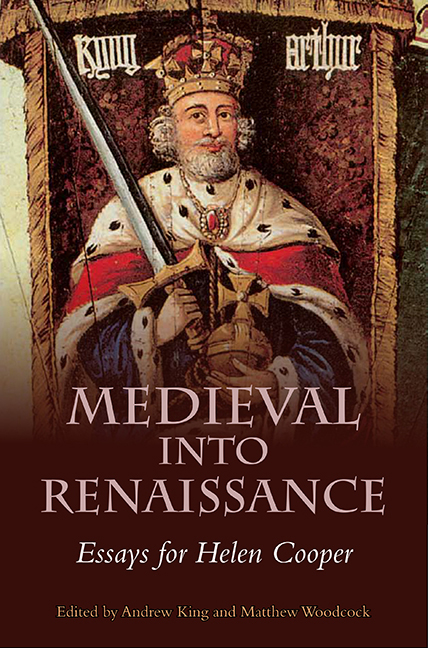Book contents
- Frontmatter
- Contents
- List of Illustrations
- List of Contributors
- Acknowledgments
- Abbreviations
- Introduction
- Unknowe, unkow, Vncovthe, uncouth: From Chaucer and Gower to Spenser and Milton
- Armour that doesn't work: An Anti-meme in Medieval and Renaissance Romance
- ‘Of his ffader spak he no thing’: Family Resemblance and Anxiety of Influence in Fifteenth-Century Prose Romance
- Writing Westwards: Medieval English Romances and their Early Modern Irish Audiences
- Penitential Romance after the Reformation
- The English Laureate in Time: John Skelton's Garland of Laurel
- Thomas Churchyard and the Medieval Complaint Tradition
- Placing Arcadia
- Fathers, Sons and Surrogates: Fatherly Advice in Hamlet
- ‘To visit the sick court’: Misogyny as Disease in Swetnam the Woman-Hater
- The Monument of Uncertainty: Sovereign and Literary Authority in Samuel Sheppard's The Faerie King
- Mopsa's Arcadia: Choice Flowers Gathered out of Sir Philip Sidney's Rare Garden into Eighteenth-Century Chapbooks
- Bibliography
- Index
- A Bibliography of Helen Cooper's Published Works
- Tabula Gratulatoria
Placing Arcadia
Published online by Cambridge University Press: 05 July 2016
- Frontmatter
- Contents
- List of Illustrations
- List of Contributors
- Acknowledgments
- Abbreviations
- Introduction
- Unknowe, unkow, Vncovthe, uncouth: From Chaucer and Gower to Spenser and Milton
- Armour that doesn't work: An Anti-meme in Medieval and Renaissance Romance
- ‘Of his ffader spak he no thing’: Family Resemblance and Anxiety of Influence in Fifteenth-Century Prose Romance
- Writing Westwards: Medieval English Romances and their Early Modern Irish Audiences
- Penitential Romance after the Reformation
- The English Laureate in Time: John Skelton's Garland of Laurel
- Thomas Churchyard and the Medieval Complaint Tradition
- Placing Arcadia
- Fathers, Sons and Surrogates: Fatherly Advice in Hamlet
- ‘To visit the sick court’: Misogyny as Disease in Swetnam the Woman-Hater
- The Monument of Uncertainty: Sovereign and Literary Authority in Samuel Sheppard's The Faerie King
- Mopsa's Arcadia: Choice Flowers Gathered out of Sir Philip Sidney's Rare Garden into Eighteenth-Century Chapbooks
- Bibliography
- Index
- A Bibliography of Helen Cooper's Published Works
- Tabula Gratulatoria
Summary
Arcadia's geographical identity as a rough, inhospitable province in Greece is well known. Yet in our shared cultural memory, it is the quintessential locus of the pastoral golden world. For sixteenth-century readers, it emerged from Theocritus's bucolic Idylls and Virgil's Eclogues, although neither of them delineates a landscape that fulfils all the criteria that Arcadia suggests within the pastoral tradition. Later, it was loaded with contingent references to the real world in the hands of Petrarch and Boccaccio, and later still, it took recognisable shape in the poem that first carried its name, Jacopo Sannazaro's Arcadia (1504). Sannazaro's locus is dotted with verdant, jewel-like seclusions, like the one where his text opens in Prosa 1:
There lies on the summit of Parthenius, a not inconsiderable mountain of pastoral Arcadia, a pleasant plateau, not very spacious in extent, since the situation of the place does not permit it, but so filled with tiny and deep-green herbage that, if the wanton herds with their greedy nibbling did not pasture there, one could always find green grasses in that place.
This is a space that would become a commonplace. A locus of the pastoral imagination, it is a common meeting ground as much for poets as for the shepherds who inhabit their poetry, so much so that when Sir Philip Sidney began his first version of The Countess of Pembrokes Arcadia with the assertion that ‘Arcadia among all the provinces of Greece was ever had in singular reputation’, that reputation was already well-established, both for ‘the sweetness of air’ and the ‘moderate and well tempered minds’ of its inhabitants that made it the ‘chiefest repairing place’ for the Muses.
The tense engagement that often characterises the pastoral, emerging from the marked juxtaposition of two very different views of that literary locus, has been explored before. Sidney's narrative itself, for instance, progresses through a constant dialogue between what we might call place and commonplace: historical concerns of the real world mapped onto a vaguely recognisable geopolitical entity on the one hand, and an established literary tradition of responses to the natural world and rustic life on the other.
- Type
- Chapter
- Information
- Medieval into RenaissanceEssays for Helen Cooper, pp. 143 - 162Publisher: Boydell & BrewerPrint publication year: 2016



